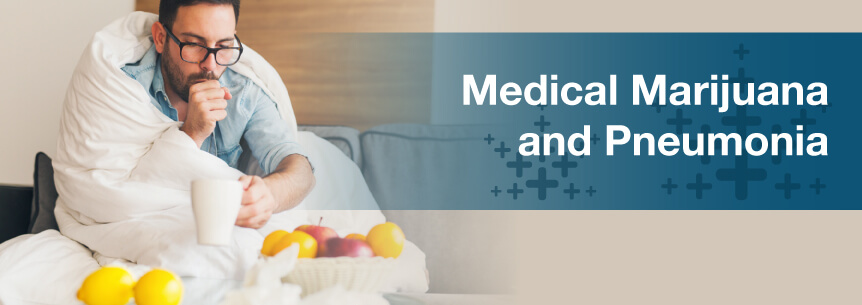
Anybody can develop pneumonia, and it’s a common respiratory infection complication. The flu is a common cause of pneumonia, but there are many other reasons you might get the condition. Children, older adults, and patients with chronic diseases like asthma and COPD have a higher risk of developing pneumonia. Its symptoms will leave you feeling miserable. Luckily, among other treatments, there’s medical marijuana for pneumonia to help relieve some of the symptoms this infection causes.
Heavy cannabis smokers have more chances of developing lung damage, since the smoke from marijuana has many of the same chemicals tobacco smoke has and is harmful to the delicate air sacs inside your lungs. Smoking small amounts of cannabis hasn’t been proven to increase your chances of COPD.
However, some studies show smoking cannabis or taking THC could have potent human airway-dilating effects. In a study published in the journal Nature, the endogenous cannabinoid anandamide in rodents revealed bronchial response dual effects. It strongly hindered a capsaicin-induced cough and bronchospasm.
You can control coughs in various conditions by targeting upper airway cannabinoid receptors.
Unlike tobacco smoke, which constricts airways, cannabis smoke causes air passages to expand. It also doesn’t lead to central respiratory depression like opiates.
In one study, bronchospasm induced by exercise led to recovery within 60 minutes with placebo marijuana and saline. A solution with around 2 percent cannabis led to an instant reversal of exercise-induced hyperinflation and asthma.
Here at Marijuana Doctors, we make it easy for you to begin using medical marijuana for symptom relief. First, you need to obtain a recommendation for medical cannabis and pneumonia treatment from a qualified doctor. You need this to become a medical marijuana patient in any state that has legalized the herb for medicinal purposes.
To get your recommendation, you must first find a medical cannabis doctor using our handy directory. Once you locate a doctor or practice in your local area, you can request an appointment. You can also search our database for a cannabis dispensary.
Find A Doctor Find A Dispensary
Medical cannabis also helps with the inflammation of the small air sacs in the lungs, which is a common symptom of pneumonia.
Marijuana for pneumonia strains that are low in THC and high in CBD are useful for patients looking for anti-anxiety, anti-inflammatory, and anti-pain treatment. Some good marijuana and pneumonia strains include:
If you have lung problems, you shouldn’t smoke medical weed. Your best bet is to make a whole plant tincture out of a hybrid strain. Place a drop under your tongue twice daily to begin, and increase when needed.
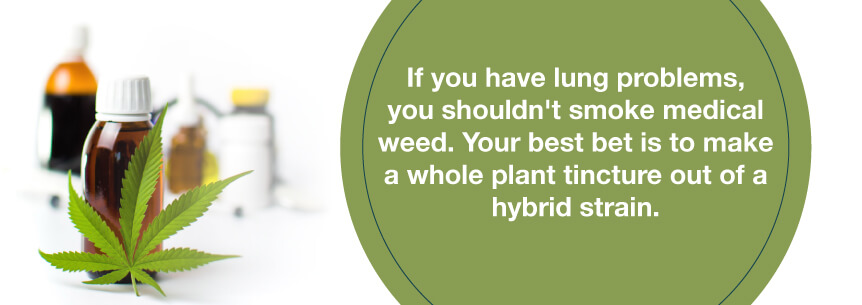
Other cannabis for pneumonia treatment methods include:
Edibles are also good, especially when made with good cannabutter. You can make oil using quality grapeseed oil or olive oil.
Pneumonia is a type of common lung infection that causes inflammation. It often develops in those who have the flu, but bacteria, fungi, and other viruses can also precipitate pneumonia. The symptoms of pneumonia can vary, and can range from mild to severe.
What caused your pneumonia, as well as the severity of your symptoms and your overall health and your age, will dictate your treatment. Typically, a healthy individual will recover from the condition within one to three weeks. However, pneumonia can be life-threatening.
You can decrease your risk of developing pneumonia by getting a flu shot once a year. Washing your hands and getting the pneumococcal pneumonia vaccine if you’re at high risk can also help prevent pneumonia.
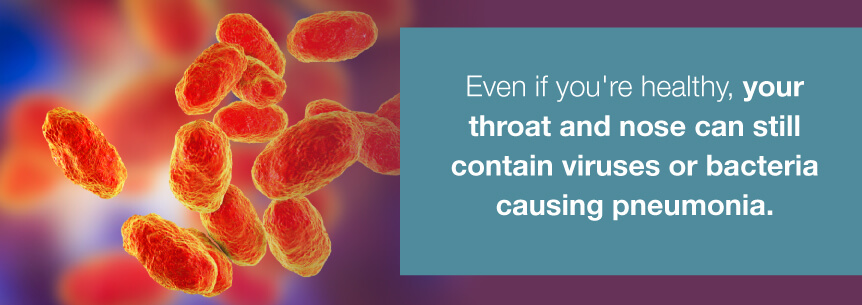
Even if you’re healthy, your throat and nose can still contain viruses or bacteria causing pneumonia. When these organisms reach your lungs, you can develop pneumonia, since your lungs are susceptible to infection. A cold or even a chronic illness like COPD are good examples of when this could happen.
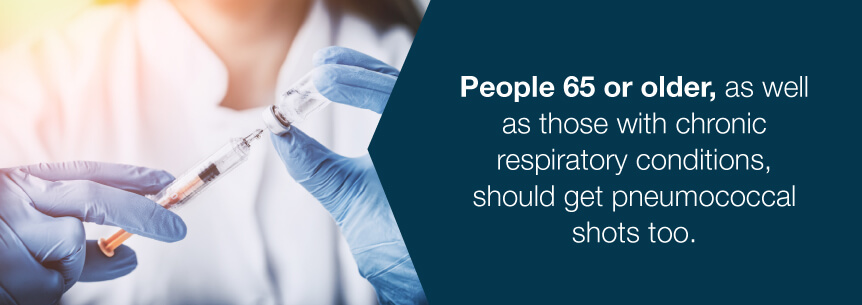
The main pneumonia types are classified by:
The germs causing the infection can also classify pneumonia.
You may also classify pneumonia based on where you acquired it.
You may also classify pneumonia based on how you acquired it.
Formerly called “The Winter Fever,” pneumonia dates back a long time. Around 460 BCE, the Greek physician Hippocrates first described pneumonia symptoms. While it had many names throughout history, people often identified it as a type of sickness.
In 1875, Edwin Klebs, a German pathologist, used a microscope to look at pneumonia bacteria for the first time. Albert Frankel and Carl Friedlander identified a couple of common bacterial causes for the condition in the 1880s.
By the 1930s and 1940s, methods of handling pneumonia included sulfonamide therapy and the antibiotic penicillin. Today, even though mortality rates from pneumonia have decreased nearly 4 percent per year since 1999, it’s still a significant worldwide issue.
As mentioned, your symptoms of pneumonia can range from mild to severe and depend on your health, age and the germ that caused the infection. With mild cases of pneumonia, your symptoms are similar to those of the flu or a cold, except they last for a more extended period.
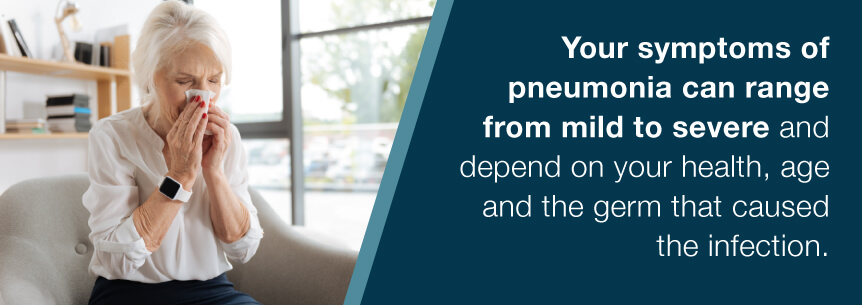
Infants and newborns might not show signs of pneumonia, or they might have a fever, vomit, cough or appear tired or restless with no energy. They may also have difficulty eating and breathing.
Some individuals with pneumonia, even with treatment and particularly those at high risk, may have complications such as:
Patients with pneumonia are almost twice as likely to end up with depression or another mental health problem, reports the University of Michigan Health System. Pneumonia isn’t just life-threatening — it’s also a life-altering event for some people. For some people, their diminished quality of life and substantial chronic care requirements are much like heart disease effects. Brain issues can be so extensive they can result in nursing home admissions and disability in older adults.
According to joint research from the University of Washington School of Medicine and University of Michigan Health System, patients who received pneumonia treatment — including those who didn’t need critical care and those who required hospitalization even once in nine years — were more than two times likelier to develop new cognitive problems.
Estimates by the American Thoracic Society show:
Pneumonia treatment involves preventing complications and curing the infection. If severe, you may require hospitalization. If you have community-acquired pneumonia, you can typically receive medication and treatment at home. While the symptoms tend to ease up in several days or weeks, you can feel tired for more than a month.
Children receive a routine pneumococcal conjugate vaccine. People 65 or older, as well as those with chronic respiratory conditions, should get pneumococcal shots too.
While this vaccine doesn’t necessarily prevent pneumonia, it can prevent serious pneumonia-related complications like bacteremia or septicemia — an infection that spreads throughout the body.
Specific treatments depend on the type and severity of your pneumonia, your age, and your overall health.
You might need to stay in the intensive care unit of your hospital if you have severe symptoms or require a ventilator.